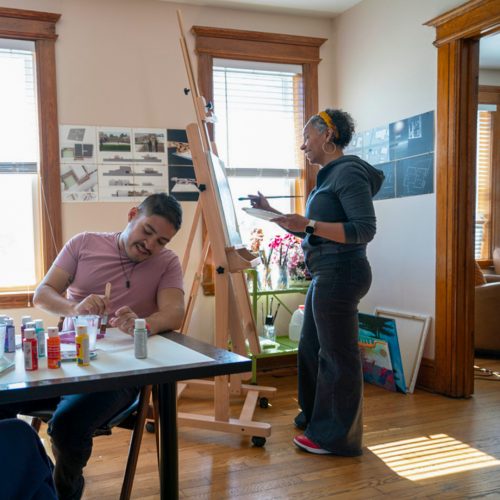
The inaugural class of the Department of Creative Arts Therapy will graduate this year on Syracuse University’s Commencement Weekend (May 9-12), with six students earning their master of science degree in art therapy.
“Our department is looking forward to celebrating the accomplishments of our first graduating class — our group of trailblazers!” says Department Chair Jennifer DeLucia. “It has been a privilege and honor to begin our journey as a department and learning community with this group of students.”
Established in 2019 as the seventh department in the College of Visual and Performing Arts, the Department of Creative Arts Therapy prepares students to use art-based approaches to counseling.
“Studying art therapy has been a lifelong goal of mine,” says Frankie Bartolomie G’24. “The program got me to where I needed to be in my life as an artist and soon-to-be art therapist.”
She noted the value of the program’s low-residency approach, which provides flexibility through online learning while ensuring students come together in person for thoughtful discussions and collaborative art making.
Partnerships with the School of Education’s clinical mental health counseling program, Falk College’s marriage and family therapy department, and the D’Aniello Institute for Veterans and Military Families allow students to explore their passions and expand learning experiences.
Sara Bessette G’24’s interests lie in disabilities and social justice. Art therapy offers an invaluable outlet for those who may be nonverbal, she noted.
Bessette created lasting ties during her internship at Elmcrest Children’s Center in Syracuse, where she will work following graduation. She hopes to one day expand her thesis work and pursue a doctorate degree.
From publishing peer-reviewed articles to presenting at conferences to initiating new programs, members of the graduating class have already left their mark in the field.
“Their growth and progress throughout the program and accomplishments beyond the classroom serve as great predictors for the contributions they will make in their communities and the broader field,” says DeLucia. “As they prepare for the next phase of their journey, we hope that the bonds formed with faculty and fellow students continue to serve as a source of inspiration and support.”
